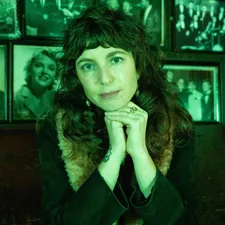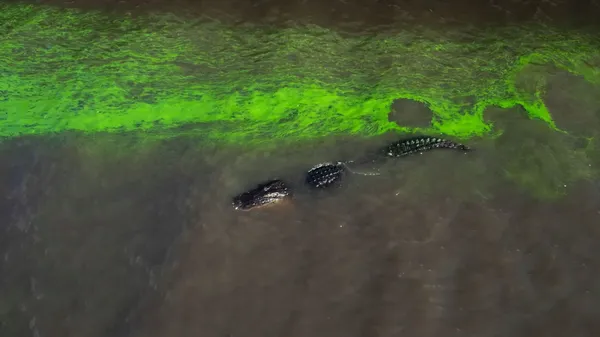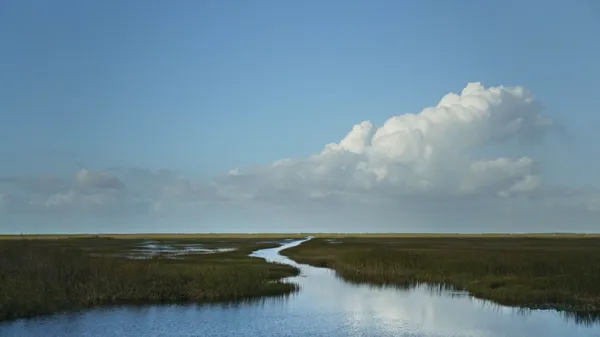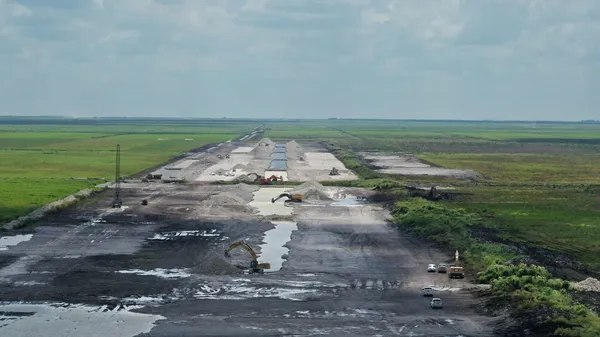Sasha Wortzel’s ambitious documentary River Of Grass flows through time and the Everglades of Florida as it probes questions surrounding human’s relationship with the landscape. Her essayistic style draws on her own observations of the area of southern Florida, where she grew up but also makes extensive use of the writings and archive footage of environmentalist Marjory Stoneman Douglas, who wrote a vital book on the area, The Everglades: The River Of Grass, which is still in print today.
Douglas’ involvement stemmed from a dream that the documentarian had but, as she explained when I caught up with her after her screening at Canada’s Hot Docs – where it won a special mention – she was already hard at work on the project.
 |
| Sasha Wortzel Photo: Camilo Godoy |
“It really began because I was watching my home get hit by more and more intense hurricanes and there was this massive fish kill along the coast, and many people, including some of my family members, were very sick with respiratory issues,” she says. “I just realised that I had been seeing this get worse and worse over my lifetime yet, I didn't quite have the language or the knowledge of why exactly, I just knew it was connected to something that we'd done to the watershed.
“So I applied to the Everglades National Park residency, it’s called Artists in Residence in the Everglades, ARIE, with the intention to do research to begin developing a film that would be set in and around the greater Everglades region. As part of that residency, I started reading Marjory's book, The Everglades: River Of Grass, which is still read as one of the key studies to the Everglades even today. I started meeting people reaching out just trying to get to know these different ecosystems in the region and identifying essential stories or participants from each of those that I could bring into the film.”
After acquiring some seed funding, Wortzel began work on what she hoped would be a collective portrait of the region that would be given historical context by Douglas’ book. But that was just the beginning of the evolution of the project.
Wortzel explains: “As things go with documentary, you have one intention and then something happens and you get swept in a new direction, which is often an even more exciting direction. So I did have a dream where Douglas came to me and let me know that she also wanted to be in the movie, that she had things to say and, upon waking, I thought a lot about how her name had unfortunately become very much associated only with the school in Parkland, that is her namesake, where the mass shooting took place. That seemed really unfortunate because she was so much more than that. And when I saw a snippet of archival interview with her, when she was in her 90s and saying these very blunt, funny and things that were very resonant with today I knew that she should be woven into the film as well.”
River Of Grass features lush film shot within the Everglades that invites us to look closely at the landscape and the creatures that rely on it as Wortzel shows that where once Lake Okeechobee was part of the vital ecosystem, it has now been impounded so that it no longer refreshes the waters as it once did. The idea of becoming more aware of the area was something that grew within the director as she began making the film, especially after meeting Miccosukee educator Betty Osceola, who runs group prayer walks through the Everglades.
“Though I had grown up in the region, I think the experience of being in the Everglades National Park, the residency, making the film, and participating in these spiritual actions, the prayer walks of Betty Osceola, deepened my connection with the place. It was as if I was getting to know a distant aunt who had always been there, but now we had established a new and deeper connection.
“I was quite shocked to realise that I was not alone in being born and raised Floridian, who did not know a lot about the histories and ecologies of where I grew up. This is something that I realised is shared by a lot of Floridians. We we know the Everglades are there but we don't understand how inextricably linked they are to our lives in Florida and we don't spend time in the ecosystem.
“So one of the things that is so moving about what Betty does is that she organises these spiritual actions. These prayer walks where she invites people of all walks of life to join and to walk, to look, to witness the landscape, to listen and to connect with each other. That was really critical. It’s spiritual yet the physical act of walking became important not only for redefining my relationship with home, it also became an important structuring device for the edit of the film, that we physically move through the landscape and that could bring us to all these seemingly disparate locations that are all tied by the water.”
Part of this growing awareness comes down to education of the ins and outs of hurricanes and the way that they affect the landscape. While almost everyone in Florida is aware of the cycles of the wet and dry seasons, and that hurricanes are a part of that, the sheer impact of hurricanes tends to be what most people focus on rather than related human activity that has made the impact of them worse.
Wortzel says: “I knew that hurricanes were a natural part of the cycles and necessary though I don't know that I could quite articulate why. Through making this film I think I did start in a place of pointing a finger maybe at the storms, because they had wreaked a lot of havoc on my life, my family, my community members. Through the making of the film, it was really an important revelation that it’s not the storms. They are a necessary force of renewal to clean the water, to clean the landscape, to regenerate.
“It's us. We have built so much, developed along our coast. We’ve basically developed almost all of our wetlands and these wild spaces that are necessary for absorbing the impact of these storms, the storm surge. So we are having historic damage and flooding and, frankly, also deaths from these storms because we have not listened to the natural cycles of where we live, and how much this peninsula, the State of Florida, can support this population. We have continued to develop and tried to re-engineer the wet and dry seasons in the name of profit, over people.
“Something that I think is really an important point about this film and about the climate emergency, is that even though this film is very specifically looking at the region of the Everglades in southern Florida, the destruction of our Wetlands and the impacts of what we've done to our wild spaces is impacting all of us globally. We really need to take a look at our role in bringing about and accelerating the climate emergency.”
For the archive footage with Douglas, Wortzel used material from the Wolfson Archives at Florida International University as well as a special collection dedicated to the author at the University of Miami.
“The Wolfson Archives was able to deliver us the dailies – the raw footage of two, very critical interviews that are woven throughout the film – and that was quite striking. Yet again, so much of what Marjory said was speaking directly to the present day circumstances that we're grappling with. I thought she had a lot of messages that resonate about the fact that change doesn’t happen overnight, you have to keep fighting and not to give up hope.”
The raw footage reveals how much ‘direction’ was going on in the interview segments with Douglas and that’s something Wortzel wanted to draw attention to.
“When I was watching the dailies, I was really struck by both the way that the cameraman who filmed that footage in the 80s was directing Marjory, setting up the scene, you know, placing the cat. And they had gone out the following day into the Florida Everglades to film wildlife and it was deeply disturbing to see the ways in which they were disrespectfully prodding a poisonous cottonmouth snake, feeding an alligator, doing all the things that we're taught not to do and really objectifying nature, directing nature to do what they desired much in the same way we've directed the wet and dry seasons to our desires and I was struck by the way they were doing that with Marjory and with the wildlife.
“Also, I think Marjory became this sort of environmental icon in her 80s and 90s. She was on the cover of Ms Magazine, she was awarded the presidential Medal of Freedom by Bill Clinton in 1993 when she was 103 years old. I think it was interesting the way in which she knew she was sometimes being instrumentalised as the face of this movement but I think she had a savvy way of navigating the media landscape that we could learn a lot from.”
A notable element of the film is the sense of a continued fight that flows right back to Douglas. In a world where the climate crisis can sometimes feel impossible to tackle, Wortzel notes its an important message.
“The fight for our environment, our wellbeing, a resilient and hopefully abundant future is not something that will be won overnight,” she says. “I know myself, IIstarted this project in a place of grief and feeling really overwhelmed and kind of powerless and through making this film, I arrived in a different place. Walking with Betty, connecting with my neighbours, getting to know how the ecosystem functions and why it's important. And these words from Marjorie, I was really struck by her saying the war may not be won but that you have to keep on fighting, it's not done overnight.
“The establishment of the Everglades National Park, which also, of course, displaced many indigenous people yet we're lucky to also have access to that space today – it took 20 years. I think it's important to not give up and to continue to struggle for the wellbeing of our communities and our environment.
The director adds that writing the personal voiceover that runs through the film was “the most challenging part of this project”.
 |
| Sasha Wortzel: 'The fight for our environment, our wellbeing, a resilient and hopefully abundant future is not something that will be won overnight' |
River Of Grass is now making its way around the festival circuit, playing Margaret Mead Festival in New York next month and DC/Dox in Washington DC in June. The director is also planning a series of community events and screenings in Florida.
Currently we are bringing River Of Grass on the festival circuit and looking to plan a series of community events and screenings in relationship with many of the participants in the film who are embedded in grassroot organising and environmental organisations. To have screenings and conversations across the State of Florida and then to build out beyond that because while these issues are extremely pressing in Florida, we are on the frontlines in the United States. This is, you know, a global issue so we’re hoping to connect with folks internationally as well.
Wortzel adds: “I also have a practice as a visual artist and as I’ve been making this film I’ve also been making objects for the gallery, I’ve made sound installations, video pieces that are intended to play in a gallery space. Many of those things actually fed back into the film, some of the visuals and the soundscapes. We're really focused on just getting the film out right now and then hopefully thinking more critically about audience engagement and bringing this to our communities. I’m hoping to screen the film and also be sharing these gallery works, this sort of installation piece, which I think offers a different entry point into the material.
“I’m thinking about how to create dynamic events that really motivate people to go and engage with Cinema and with our film.”
- For more information about River Of Grass, visit the official site























